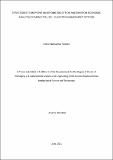| dc.contributor.author | Richard, Edwin | |
| dc.date.accessioned | 2021-09-22T12:25:17Z | |
| dc.date.available | 2021-09-22T12:25:17Z | |
| dc.date.issued | 2021-06 | |
| dc.identifier.uri | https://doi.org/10.58694/20.500.12479/1311 | |
| dc.description | A Thesis Submitted in Fulfilment of the Requirements for the Degree of Doctor of
Philosophy in Environmental Sciences and Engineering of the Nelson Mandela African
Institution of Science and Technology | en_US |
| dc.description.abstract | Different strategies have widely been applied for improving the anaerobic digestion of the
organic fraction of municipal solid wastes. However, because of the heterogeneous compositions
of organic fraction of municipal solid wastes, studies on different strategies are still required.
This thesis focused on examining methods to improve anaerobic digestion of organic fraction of
municipal solid wastes and environ-economic analysis of municipal solid wastes management
options. Firstly, the study examined the effects of fungal (Pleurotus ostreatus) treatment of the
banana leaves wastes towards edible mushrooms and biogas recovery. Secondly, the study
assessed the effectiveness of banana winery wastewater in digesting the banana leaves wastes to
improve methane yield. Thirdly, the study examined the potential of edible clay soils towards
improving the anaerobic digestion of food wastes for biogas recovery. Next, the study analyzed
and compared the environmental impacts of anaerobic digestion and other municipal solid waste
management scenarios in the Arusha City of Tanzania. Finally, the study assessed the economic
feasibility of the biogas plants for treating food and banana leaves wastes in the Arusha City of
Tanzania. All the anaerobic digestion experiments were carried out in batch reactors. The
environmental impact was analyzed using a life cycle analysis methodology. Fungal treatment of
banana leaves wastes prior to anaerobic digestion process resulted in the biogas yield of 282 mL
g
-1
VS
-1
and production of 181 ± 19 g of edible mushrooms per 2 kg of banana leaves wastes.
The cost analysis revealed that mushroom cultivation has a higher economic value and therefore
favoured before the anaerobic digestion process. Banana winery wastewater pre-treatment of
banana leaves waste resulted in increased methane yield by 193% compared to non-pretreated
banana leaves waste. The edible clay soils supplementation in the anaerobic digestion process
resulted in an increase of 26.9% methane yield in a reactor with edible clay soils supplementation.
Evaluations on environmental impacts revealed that the anaerobic digestion process outranked
the current management option (Landfill) with the least environmental burdens. The study also
revealed it is economically viable to invests the biogas plants for treating food and banana leaves
wastes in Arusha City of Tanzania. | en_US |
| dc.language.iso | en | en_US |
| dc.publisher | NM-AIST | en_US |
| dc.subject | Research Subject Categories::NATURAL SCIENCES | en_US |
| dc.title | Strategies to improve anaerobic digestion and environ-economic analysis of municipal solid wastes management options | en_US |
| dc.type | Thesis | en_US |

